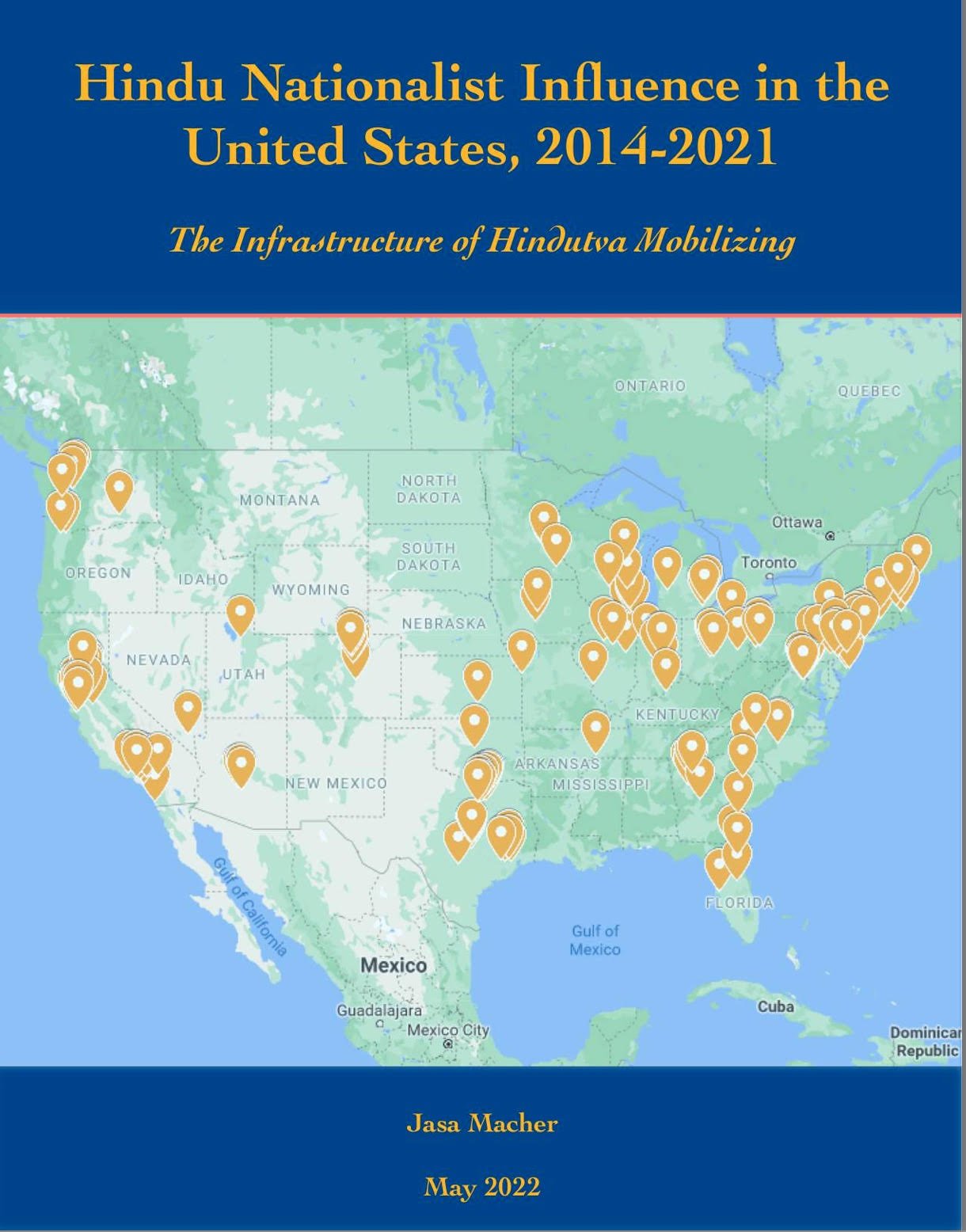Hindu Nationalist Groups Seek to Saffronize USA Policies Says Report
June 18, 2022
Earlier this month in Washington DC, Antony Blinken, the U.S. Secretary of State, released the 2021 International Religious Freedom Report. The report offers a review of the state of religious freedom in nearly 200 countries and territories around the world. Blinken highlighted that in India, “we’ve seen rising attacks on people and places of worship.”
Some officials in India are ignoring or even supporting rising attacks on people and places of worship in the country, Rashad Hussain added. He leads the U.S. State Department's efforts to monitor religious freedom around the world.
U.S. reports in previous years have also identified the groups involved in religious freedom violations in India. The 2018 report, for instance, states that In March that year, media reports noted that the members of the Bajrang Dal, the “Youth Wing of the Hindu Nationalist Group Vishwa Hindu Parishad (VHP),“ chopped off the finger of a Muslim woman, Roshan Bi, and attacked her son Farzan Saiyed in Chattral town in Gujerat when they did not follow warnings to restrict their cattle grazing only to Muslim neighborhoods. Saiyed later died from his injuries.”
The 2017 U.S. Report noted that in October that year the head of the VHP “stated Christian missionaries must leave…(India) or else be forced to do so.” The 2014 U.S. Report noted that “Christian Organizations claimed that...officials (in Sirsiguda, India) denied government food rations for two months to 50 Christians and that village shops also reportedly refused to sell goods to Christian families following VHP pressure.”
Since the 1970s, to counter “accountability efforts that may arise from the U.S. government’s own reports on religion-based violence in India,” Hindu nationalists in the U.S. have been building their influence and information ecosystem in different social spheres. This is according to a May 2022 report titled “Hindu Nationalist Influence in the United States, 2014-2021: The Infrastructure of Hindutva Mobilizing,” authored by Jasa Macher.
In 2014, when Narendra Modi, leader of the Bharatiya Janata Party (BJP), first became Prime Minister, Macher released a report titled “Hindu Nationalism in the United States: A Report on Nonprofit Groups.”
The “militant, paramilitary Rashtriya Swayamsevak Sangh (RSS)” in India is a proponent of Hindutva, or Hindu nationalism, believing that Hindus should have political dominance in India, the 2022 Macher Report notes. The RSS is said to control Modi’s BJP, the VHP, the Bajrang Dal and several other affiliated organizations in India.
The 2022 Macher report studied the Vishwa Hindu Parishad of America, Sewa International and five other organizations said to be affiliated to the Hindu Swayamsevak Sangh (HSS), reportedly the U.S. arm of the RSS. Between 2001-2019, according to available tax returns, seven Sangh-affiliated charitable groups reportedly spent ”at least $158.9 million on their programming, sending much of it to groups in India.”
The report “presents evidence” of funding flows between different Sangh-affiliated groups and their strategies to influence U.S. social, educational, and political institutions, including efforts to cast Sangh groups as cultural gatekeepers and representatives of Hindus; fund Sangh groups in India; insert support for Hindutva histories into U.S. academic institutions and textbooks; shift U.S. domestic and foreign policy pertaining to South Asia; finance Sangh-friendly politicians in the U.S.; and “target their critics.”
In 2020, the Macher Report states, there were 222 shakhas (chapters) of the HSS across 32 states and 166 cities in the U.S., “operating weekly with an estimated 8,880 participants in its youth and family programming, according to tax records and HSS’s 2019-2020 annual report.” The Vishwa Hindu Parishad of America reportedly operates 21 chapters in 14 states, according to its website; its cultural projects often use different names, such as the Swami Vivekananda Family Camp or Hindu Mandir (temple) Executives Conference.
The 2022 Macher report names 24 U.S. “Hindu Nationalist” Organizations in the U.S. who are “strengthening their status in the Indian diaspora via youth and cultural programs, charitable work, outreach to government officials,” in order to cultivate “a community that sees the world through a prism that ignores or supports Hindu nationalist violence and discrimination” in India.
Nineteen of the organizations had assets totaling $98 million; the Vishwa Hindu Parishad of America had $5 million in assets in 2019; and the Hindu American Foundation, a political advocacy and charitable funding group, $3 million in 2020. The Macher report could not find data on assets held by the remaining five groups.
On the policy front, between 2012 and 2020, 100 offices of elected representatives of the U.S. Congress were visited by HSS volunteers, coordinated by the Hindu American Foundation, the Macher report states. Between 2015 and 2020, Raja Krishnamoorthi, a Democrat who represents a district in Illinois in the U.S. Congress, received $115,000 in funds from the Hindu American Political Action Committee and “Sangh affiliated persons” based on Federal Election Commission filings, according to the report.
In 2017, Krishnamoorthi was one of 17 U.S. elected officials who wrote individual letters to California’s education board to reject school textbooks which discussed caste and other oppressive practices of Hinduism. In contrast, South Asian Histories for All, a multi-faith and inter-caste coalition, urged the board to approve only those textbooks that tell a factual history, including about the caste hierarchy in Hinduism, OutlookIndia reported.
According to tax records and its annual reports, between 2010 and 2016, “the Uberoi Foundation spent at least $561,000 in the U.S…toward influencing public school textbooks, establishing university endowments, undertaking teacher training programs, distributing research grants, (and) developing educational materials,” aimed at saffronizing South Asian history. To saffronize, the 2022 Macher report adds, “is to bring an institution or social sector into closer alignment with Hindu nationalism.” Saffron is the dominant color of the flags used by the RSS and its affiliated organizations.
In the field of higher education, between 2012-2016, the Dharma Civilization Foundation, affiliated with the HSS, reportedly offered more than $13 million “toward establishing academic programs or chairs at the Graduate Theological Union, University of California at Irvine, and University of Southern California, with UC Irvine refusing the offered funds.”
The Hindu American Foundation, mentioned in Macher’s 2022 report, emailed The Print stating that it “is a wholly independent, American organization. It has absolutely no affiliation or ties to any organisations or political parties in the US or abroad.”
As The Print and other media have pointed out, Macher appears to be a fictitious name, who though responds to emails. The report is based on research of tax records and government filings, public statements, websites, and news reporting. So, the facts in the report are apparently not in question.
The 2022 Macher report found no financial information on the political advocacy group Overseas Friends of the BJP, which is registered in the U.S. under the Foreign Agents Registration Act. Given the scrutiny of the financing and activities of Hindu Nationalist groups in the U.S. by Macher and others, it is likely that more of them may figure out ways to avoid legal requirements of disclosing financial information and lobbying goals. But publishing less information will likely also hurt their fund raising and lobbying efforts.
For access to stories each week, follow on: LINKEDIN or TWITTER or FACEBOOK







